The 1970 Hampshire Individual Chess Championship (for the 1969 / 70 season) was held over two weekends in October 1969 at Southampton University. 24 players battled over 10 rounds, with Seth Saverymuttu achieving an excellent eight and half points, to finish half a point ahead of Marshall Thompson. The order I am posting these articles on the Hampshire Chess Championship is fairly random, but I do have the crosstable and some games from the previous year, and I will try and post that in the future.
If you wish to see the previous year, the details are in the Hampshire Bulletin (GK) no 7 Nov 1968.
Contents
For a list of the winners of the Hampshire Individual Championship and links to any articles I have written, the table on the Hampshire Individual Championship is the best place to look. In addition, the table on the Hampshire Tournaments will detail these and any other tournament articles I have completed. Both of these are available from the menu at the top of the site as well.
Tournament
The Hampshire Individual Chess Championship has used numerous formats in the last 90 odd years, from the Knockout format in 1930, qualifying sections e.g. 1932 to the current Swiss tournament held over three days. The format used for the 1970 Championship was a ten round Swiss, played over two weekends at Southampton University. The details were included in the September 1969 Hampshire Bulletin (No 11).
The Hampshire Senior Individual championship will again be held at Southampton University on the weekends of 3rd/5th and l0th/12th October. Play is from 6.15pm to 10.15pm on Fridays with two rounds on Saturdays and Sundays at 9am to 1pm and 2.30pm to 6.30pm each weekend.
Hampshire Bulletin September1969
The rate of play is 24 moves per hour and one time check at the end of 2 hours. The Tournament is 10 rounds Swiss and unfinished games will be adjudicated by the Conductor. whose decision will be final.
In total 24 players entered, and as I have the grading details for 1969, the players sorted by grading are detailed below. Although John Jones was the only player graded over 200, there were five others in excess on 190. I tend not to have played many players from this period, and those I have played I have normally ended up on the wrong side of the result. In this case I have played six of them, and even managed to beat John Jones (admittedly he was graded 35 points lower than his 1969 grade). My other game against John was a draw.
The other players I have played were Gerald Bennet (loss), AM Edmonds (loss), John Patience (1 loss, 2 draws), Alec Samuels (3 draws) and Iain Stenhouse (2 losses, 4 draws). Therefore I have a record of 1 win, 10 draws and 5 losses.
Although John Jones was the highest graded, Seth Saverymuttu was the reigning champion and probably came in as the favourite. I have noticed that older championships refer to the second year of the season of the Championship, whereas now we refer to the actual year the tournament is held. This tournament was played in October 1969, but is the 1970 Hampshire Championship, whereas the Championship from November 2023 is the 2023 Championship.
Players
- John H Jones 203
- Seth Saverymuttu 198
- PM Collins 196
- Gerald H Bennett 194
- AM Edmonds 190
- P John Patience 190
- Marshall WJ Thompson 184
- BF O’Sullivan 178
- AC Barton 177
- AR Cullinane 173
- HD Vardajan 172
- RM Ellison 171
Players
- Alec Samuels 170
- S Townsend 169
- TI Cowling 169
- Sq-Ldr L Vine 164
- M Roberts 160
- Iain A Stenhouse 159
- David E Bower 158
- GL Pritchard 157
- MW Johnson 151
- SL Russell 151
- JA Bassett 139
- F Grumbley 132
The Final Table was detailed in the Hampshire Bulletin no 12 along with an interesting report by one of the players, PM Collins, who only played the one game (loss to RM Ellison). PM Collins was the Games Editor for the Hampshire Bulletin for a short period (no 11 to 17). A strong player and he certainly had his own opinion on chess.
Although there is no round by round results the tournament was a two horse race between the defending champion Seth Saverymuttu and nine time Hampshire Champion Marshall Thompson. The crucial games seems to have been the ones against John Jones which Thompson lost and Saverymuttu won. The loss by Thompson was the only game lost by the two players at the top of the table in the tournament.
Savermuttu finished on eight and half points and Thompson half a point below. Three players finished in a distant third place, HD Varadajan, John Jones and Gerald Bennett.
Final Table
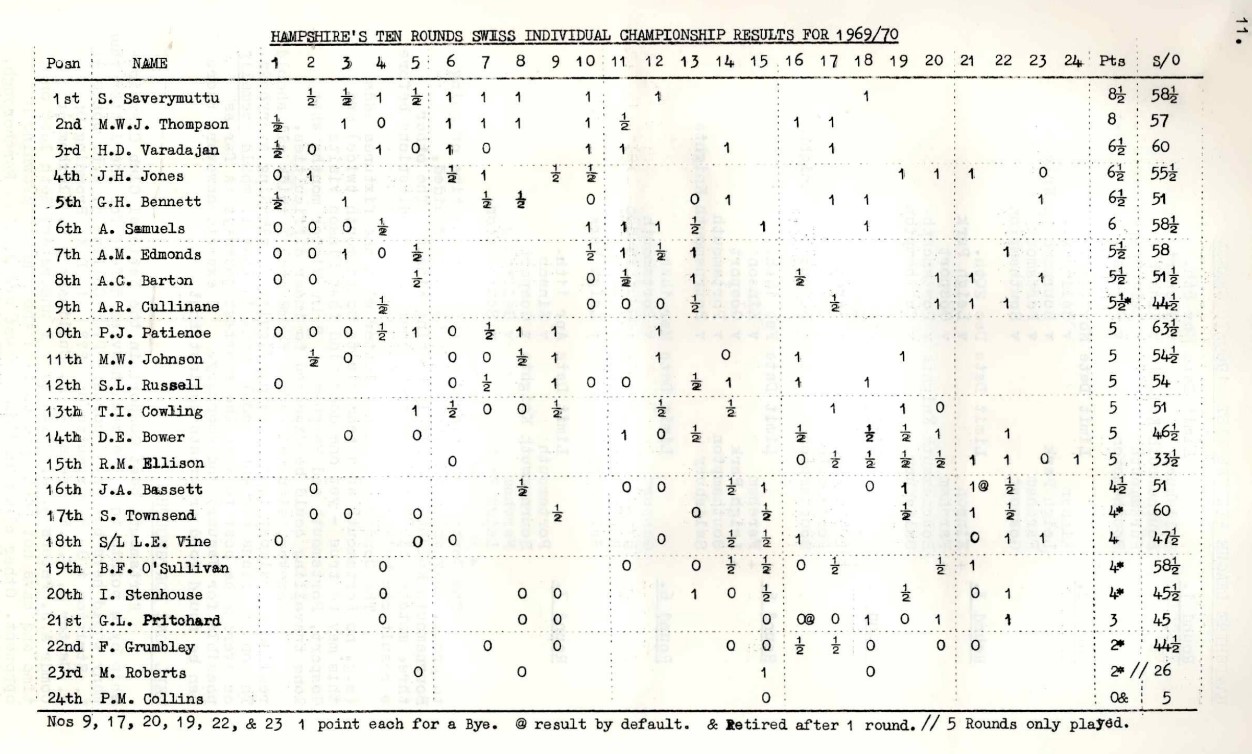
As mentioned PM Collins produced an interesting report on the championship and he was not particularly complimentary on the standard of the games played. It is unknown if the mental stress of the tournament was too much for Mr Collins, as he withdrew after losing his one game.
But the fact that he added some of the games to the bulletin is appreciated, and I give these with his comments (and some of my own) and you can make your own mind up as to the quality of the games.
The Hampshire Individual Championship, which was-competed for at the beginning of October over two weekends, is a form of tournament which is becoming increasingly popular nowadays. Normally only one single weekend is used and, if a large number are competing, a single loss can mean you are out of the prize list. An interesting question to be answered is what type of player is best suited to the rigours of such, tournaments and what standard of Chess is reached.
PM Collins – Hampshire Bulletin November 1969
It is with these questions in mind that I examined the games of the Hampshire Individual. It soon became apparent that the standard of Chess was very low indeed and I wondered whether this was the direct result of the heavy mental and physical stresses the competitors were under. It was then that the following games became relevant:-
Games
With Mr Collins comments above I think it is best to look at the games he supplied. These are all from the first round. For the first three games he did not provide any annotations, just highlighted the blunders. I have added my own comments.
The first game sees the top seed John Jones against Brian O’Sullivan. Both of these players were about 30 years old in 1969. I don’t know much about Brian but John Jones was a stalwart of Gosport Chess Club, a very aggressive player and at his best able to beat pretty much anyone.
John Jones in 1969 (with Seth Saverymuttu’s sister Manel also in the photo) and again in approx. 2000 with left to right Dave Holmes, Peter Eales, Brian Grant and Rick Smith.
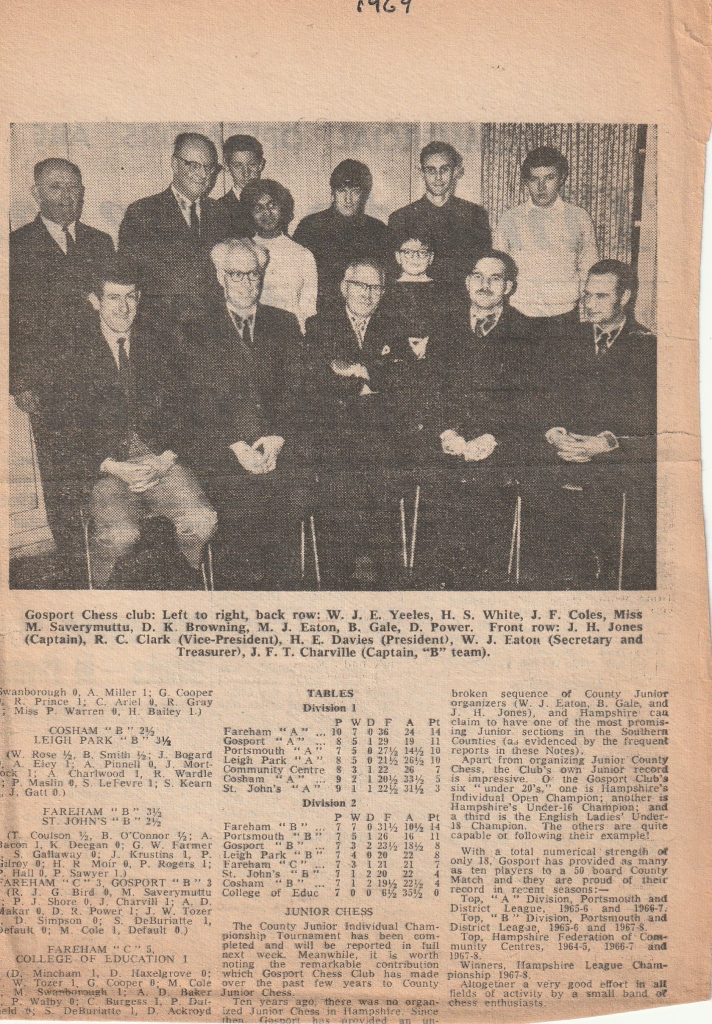
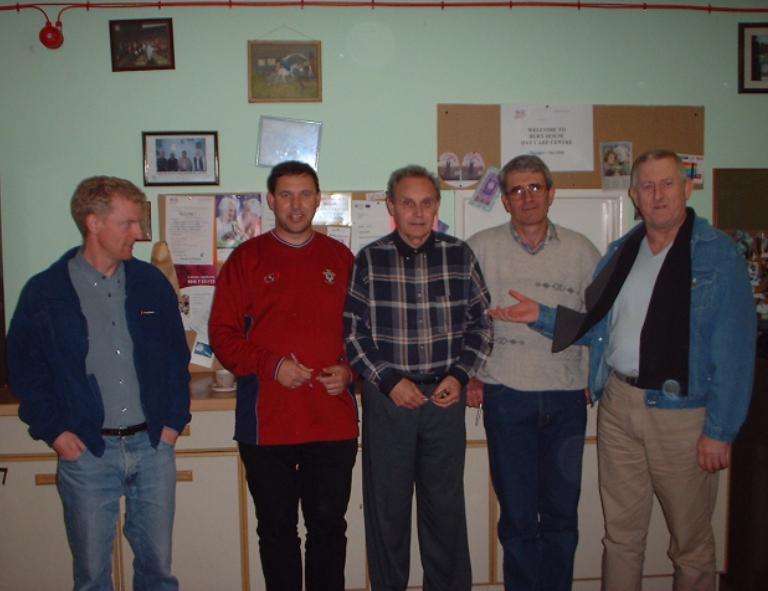
The next game is between Bob Cullinane and Maurice Johnson.
The third game saw Terry Cowling taking on Iain Stenhouse. Terry played for Hampshire until 1992/93, but is not a player I ever come across. I played Iain Stenhouse numerous times from 1992 to 2001. Iain played for Southampton Chess Club and was their club champion in 1972 and 1979. He also won their quickplay tournament (1991) and under 140 title in 2000.
Iain also wrote the Chess column for the Southern Evening Echo and when the British Newspaper Archives make these available they will be a great source for research. This could be a while though, as currently they have only been scanned up to 1910.
In the game although White blundered his Queen after an incorrect sacrifice, his position was already much worse. In general you can see why White decided to gamble with the Bishop sacrifice, rather than suffer for a long time defending a worse position.
Below is PM Collins comments on these three games. I am not sure I would have published these three games to hammer home a point, as I am sure there were much better games to include in the Bulletin. You could say I am doing the same, but I have limited games to show you from the Championship.
All contain a gross blunder, the sort of mistake and error of judgment that one attributes to careless thinking, or bad mental analysis. The former reason can itself be a direct result of mental fatigue. Nevertheless all these games were played in the first round and the conclusion is obvious. No direct correlation could be made with the existence of these games in the opening round.
PM Collins – Hampshire Bulletin November 1969
(All went wrong on 17 to 19th move -could there be any external explanation to cause slight distraction. Be interesting to see clock times. GW Kilmister)
But, Mr Collins also included four games by the winner which did not include these type of blunders, and I give these below. These include the crucial draw between the winner and runner up of the Championship, along with a game between Marshall Thompson against HD Vardajan.
The first game is against Southampton Chess Club player John Patience. John Patience actually moved to Las Vegas and played professional poker. This was before the Poker boom, but he had to return due to the amount of time he was there. I spoke to him about this and he mentioned that it was a shame he had to move back as he enjoyed his time. As well as being a strong chess player he was also a strong enough poker player to make a living, but he probably missed out on the best time to play professionally.
John was Southampton Chess Club champion in 1965, 1966 (shared with Chris McSheehy) and 1970.
The next game was Saverymuttu’s one against Alf Edmonds, who was Hampshire champion in 1962 and was graded 190 at this time. Alf was also Southampton Individual Champion four times in the 1960.
This is an excellent game, with White completing two very pretty sacrifices. As to the accuracy I copied this into Lichess which gives just two inaccuracies for White.
One of the key games of the tournament was Saverymuttu vs the top seed John Jones, In an exciting King’s Indian Defence. Like the game against Alf Edmonds this shows excellent attacking with the Queen and Knight(s) by Saverymuttu. It seems that he was also happy playing both King and Queen pawn openings. Peter Collins annotated this game and I have added some additional thought. PC for Peter and GS for me.
The next game included in the Hampshire Bulletin was a fine win by 9 time champion Marshall Thompson against HD Vardajan. This is an instructive game where White gains a nice edge and plays some small tactics which allows him to open up Black’s King. This must have been a very unpleasant game to defend.
The final game was the one between the champion and the runner up, where both players were better at different stages of the game, but the final position was completely level. A very competitive game where Marshall Thompson was probably disappointed to not win from his opening advantage.
Peter Collin’s Summary
Peter Collins supplied a final summary of sorts on the tournament games below.
It is often restrictive attitudes that negate the beauty of Chess. As soon as individual results take precedence over playing chess for the game’s sake, then stereotype dull unimaginative chess necessarily evolves as the dominant feature. It was obvious that, in playing through the Tournament games, this was the policy competitors we’re adopting This is not to say it is wrong, but that most of the spirit and adventure in the game is lost. Perhaps the form of the tournament demands such an attitude, but I doubt very much whether this is true. It is largely a matter of individual response
PM Collins – Hampshire Bulletin November 1969
There was a time when I way young that the eventual result of the game mattered very much, but this wasn’t everything to playing chess. The art form is just as important. How many players were trying to play originally and dynamically? (We even had a twelve move draw.) Is that playing chess or. playing to get a half point?).
Modern Chess hides under a veil of pretence. It pretends to be progressive and stimulating to the mind, but everyone is encouraged to learn the openings, read books, play competitively and and improve your. gradings. In all this charade the beauty is stultified. It is unfortunate that where an occasion like a tournament presents a suitable opportunity to play imaginatively, team loyalty and individual prestige still plague the mind.
I envy problem composers and solvers who are directly concerned with the beauty of chess since they can carry on their thinking by themselves. They have no need for an opponent, and it is the very fact that one has an opponent that in the end influences the way in which one plays.
Players
I decided to find out what I could on the Champion and Runner up of the 1970 Hampshire Chess Championship. I am sure older players will have more information on both of them, so please do supply for me to update the article.
Seth Saverymuttu – 1st Place
Seth Saverymuttu would have only been around 17 (born 1952?) at the time of the tournament and was obviously a great talent. He had shared first place in the 1967 British Under-16 Championship and shared 12th to 15th in the 1968 British Boys’ Under-18 Championship. He played for Gosport Chess club, along with his sister Manel who was also a very strong player (151 rating in 1969). She won the 1968 British Girls’ Under-18 Championship, and was also second in the 1967 championship behind Scotland’s Kathleen Hindle (formerly Patterson) and Chess Scotland have an excellent biography of Kathleen on their website Chess Scotland.
Seth played in the 1969 British Chess Championship finishing with 5 points from 11 games which is an excellent result for a 17 year old, and represented England Juniors in at least one Glorney Cup (1970).
He also won the Glasgow 1970 Junior International Invitation Tournament, details of which are available from the Chess Scotland Website. A photograph of Seth from this tournament with some of the best UK juniors including a 15 year old John Nunn is below.
At the very back: Iain Sinclair (l) and Michael Rosenberg (r). In front of Michael are Raj Bhopal and Eric Holt. The next row, from left to right, has Stan Beaton of Cathcart Chess Club, who was assisting with the tournament, R. O’Hare, David Findlay and Allan Radlow (partly hidden). In the front row, from left to right, is David James, John Nunn, Richard Bailey, Robert Bellin and Seth[na] Saverymuttu. Source Chess Scotland
I think Seth drifted out of chess after the junior stage, but seems to have played from 2013 to 2020 for Baddow Chess Club which is in Essex although not to the level which he was playing in 1969.
Marshall Thompson – 2nd Place
Marshall Thompson won the Hampshire Individual Chess Championship nine times, or nine and a half if you count the 1963 championship1. In addition to this he won the Southampton Individual Championship seven times and Southampton Chess Club’s championship four times.
Marshall’s chess career was before mine, but I know that Southampton Chess Club members thought highly of him. He was always a threat in these tournaments, normally chasing for top spot. I understand he has some health issues and spent time in hospital due to wellbeing issues, but was obviously fit enough to win many tournaments.
Summary
I don’t agree with PC Collins position on the Championship. There were a number of very strong players and Seth Saverymuttu and Marshall Thompson dominated with a plus 7 and 6 score respectively. It is always good to have games from the tournament, and the ones from the winner and runner up were excellent. I particularly enjoyed Marshall Thompson’s win against HD Vardajan.
Acknowledgements and Sources
- Hampshire Chess Archives
- Britbase for Gerald Bennett photograph and British Championship details
- Chess Scotland
- Under the 1963 Championship it was stated there was no tournament. This was not the case as it was played and Marshall Thompson and WJE (Jim) Yeeles finished tied on 6 points. The rules stated that a 2 game play-off should be completed for the title, but when this was not played after four months the top 2 places were null and voided, and no trophy was awarded. A harsh decision, but at least we know the tournament took place. ↩︎
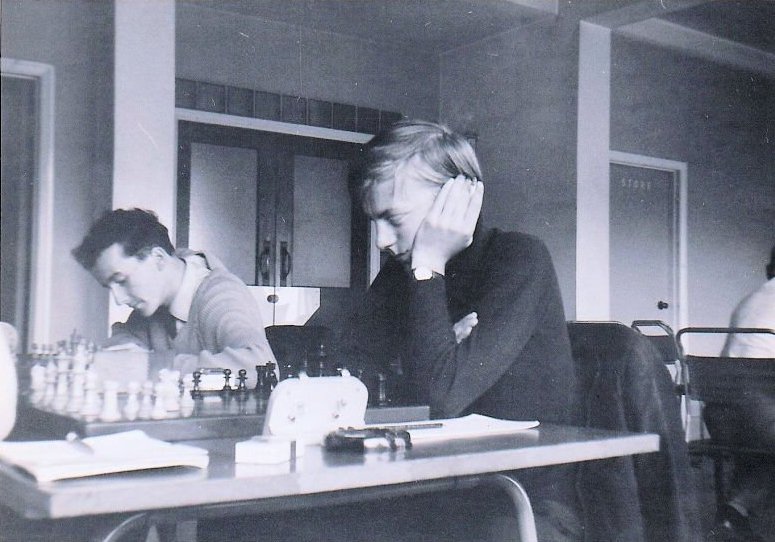
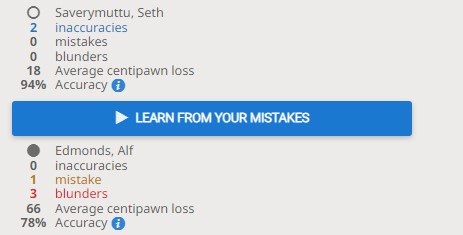
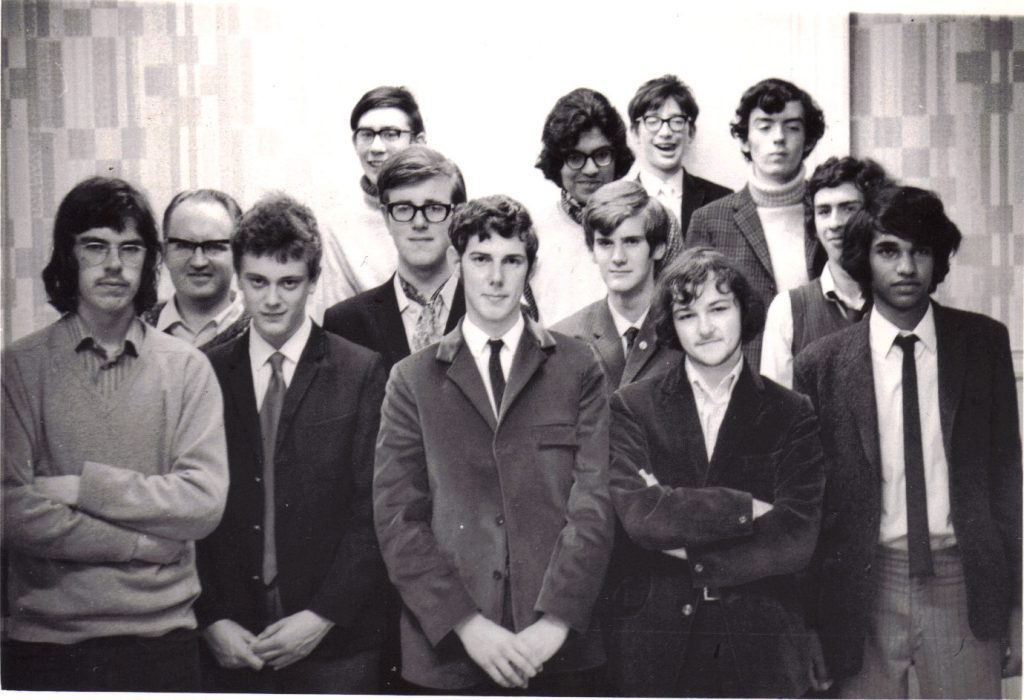
1 thought on “Hampshire Individual Chess Championship 1970”